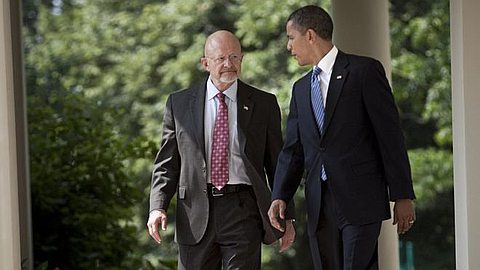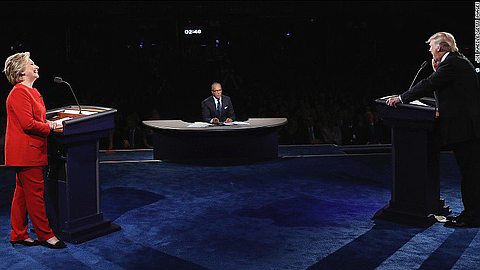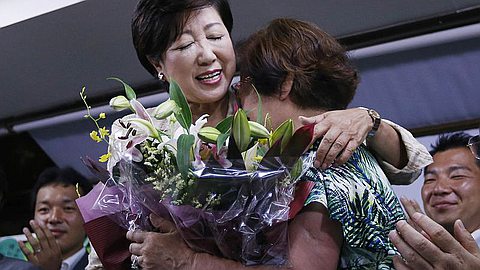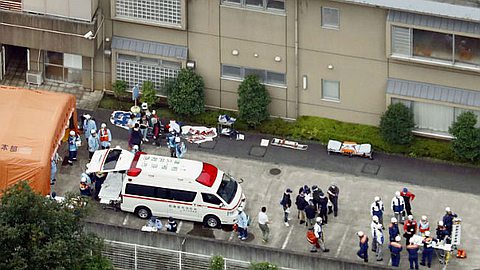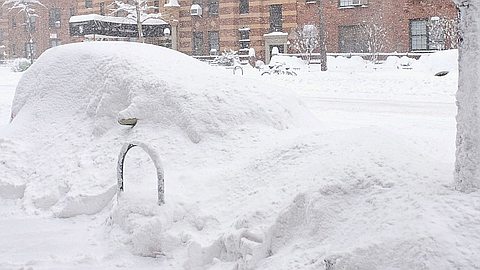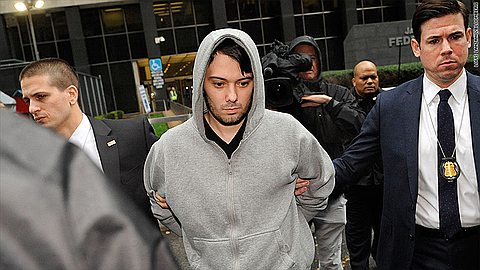Here's Why Obama Decided To Go to Hiroshima
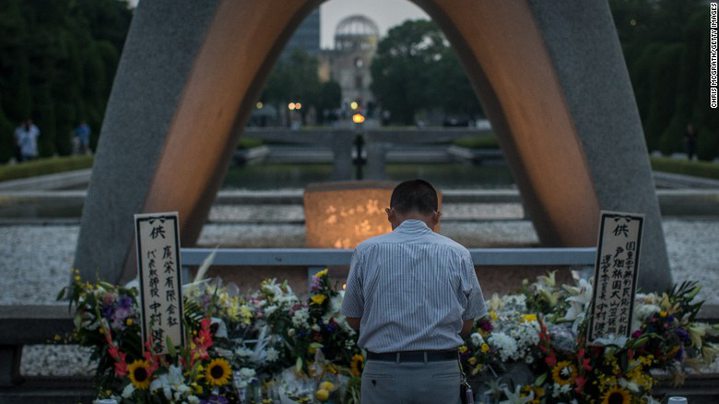
From its conception, the visit -- a first by a sitting president -- has been fraught with the struggle to show empathy for the massive death and destruction caused by American military might without appearing to apologize for what many historians consider necessary action that resulted in the saving of lives.
Obama said Thursday at the G-7 meeting in Japan that he is going to Hiroshima to underscore the "very real risks" of nuclear weapons and the "urgency that we all should have."
He called the dropping of the atomic bomb an "inflection point in modern history" and is something "all of us have had to deal with in one war or another," adding that the "back drop of a nuclear event remains something that i think presses on the back of our imaginations."
Differing views between the U.S. and Japan about the bombing, coupled with other festering grievances about the World War II, had long prevented a presidential visit to the site. At the beginning of his term, Obama was advised by Japanese officials to stay away, despite his stated desire to go there.
"From the beginning of this presidency, we were told the President has an interest in visiting Hiroshima," said Kenichiro Sasae, Japan's ambassador to the United States.
The seeds were sown for an eventual visit as far back as 2010, when John Roos, then-U.S. Ambassador to Japan, became the first American diplomat to participate in the annual memorial observance in Hiroshima. Roos had visited the memorial a year earlier with his family, and felt a strong desire to commemorate the occasion in a more formal way.
The White House and State Department, Roos said, were very supportive of the move.
"We examined all the different implications of it and decided it was the right time to go," Roos told CNN.
"It was an incredibly moving, powerful ceremony and the Japanese were not only supportive, but very moved that a representative of the United States would be at the commemoration," he recalled. "Even to this day, I have Japanese leaders and people on the street thank me and say that it took our relationship to a new level."
Subsequent visits by current U.S. Ambassador to Japan Caroline Kennedy and, most recently, Secretary of State John Kerry, who traveled to Hiroshima last month, further helped lay the groundwork for Obama's visit.
"Each time each of us went, the reception and the symbolism of the visits helped paved the way for the President," Roos said.
Not everyone is on board
Even before Kerry arrived in Hiroshima for a meeting of G7 foreign ministers in April, White House advance teams were quietly preparing for a possible presidential visit.
Kerry and others in the State Department, including Danny Russel, his top Asia diplomat, were in favor of Obama making the trip, but other Japan specialists throughout the administration were more cautious. They were concerned it would look like an apology no matter what Obama said and spark a political backlash during a toxic presidential campaign in which nuclear weapons have become a hot button issue.
Kerry laid a wreath at the city's atomic bomb memorial in April and visited the Bomb Dome, over which the A-bomb exploded. He then toured the Hiroshima Memorial Peace Museum that documents the devastating impact of the attack, including victims' and survivors' burnt clothing and personal effects.
He was particularly moved, aides say, by the museum's display of a panorama of the city limits before the blast, followed by a computer simulation of the bomb over the city before showing the devastation caused by the attack.
When Kerry came across the clothing of school children and the charred tricycle of a 3-year-old boy who perished near ground zero, Kerry grew somber and quiet. He later was buoyed by the juxtaposition of 800 school children meeting the ministers outside as a message of the future and of hope.
Kerry had a set of prepared remarks addressing what a moving experience his visit was, and reaffirming the need for a world without nuclear weapons. But when he took the podium, Kerry went off script and spoke from the heart.
"It is a gut-wrenching display. It tugs at all of your sensibilities as a human being," Kerry said of the memorial. "It reminds everybody of the extraordinary complexity of choices of war and of what war does to people, to communities, to countries, to the world. This was a display that I will personally never forget."
Asked if this meant Obama should come, Kerry said, "Everyone means everyone. So I hope one day the President of the United States will be among the everyone who is able to come here. Whether or not he can come as president, I don't know."
Tamaki Tsukada, press minister for the Japanese embassy in Washington, called Kerry's visit a "great ground leveler" for a possible visit by Obama.
"Many Japanese people were moved by his very frank disclosure of his personal thoughts," he said of Kerry. "It was very well received."
Kerry's visit erased any doubts
Three weeks later, the White House announced the President would indeed visit Hiroshima. While Obama was already inclined to make the trip, administration officials and experts on Japan believe the quiet, respectful tone of Kerry's visit swept aside any remaining skepticism and doubts about the visit.
"Ambassadors Ross and Kennedy made this about a human gesture and not a historical judgment. But it became clear the President could do it because of the way Kerry went," said Michel Green, who served in the National Security Council as a top adviser to President George W. Bush and is now a vice president and Japan chair at the Center for Strategic and International Studies.
"It was a human gesture without any political context," he added. "The tone was just right and played well and gave confidence to the White House and the Abe government about a presidential visit."
In visiting Hiroshima Friday, the President must thread the needle between acknowledging history and paying tribute to the victims without appearing to apologize. Although at least 140,000 were killed in the bombing, and an additional 40,000 or more in the subsequent bombing of Nagasaki, most Americans consider it a necessary evil to end World War II and save further lives, although that number has been declining over the years, polls show.
Expectations have been building among the Japanese public, but Japanese officials say the people neither expect, nor want, an apology.
"This is not an issue after 70 years," Tsukada said. "People in Japan are generally welcoming of this visit to reflect on the devastation of human suffering. I think that is what we need. We have to pass this message to properly learn this lesson. It is more forward looking than moving back."
With the backdrop of Hiroshima's legendary bombed-out dome as a poignant illustration of the cost of war, the White House has made clear the President hopes to use his appearance to focus the world's attention on his nuclear proliferation agenda.
"As we get farther and farther away from the use of nuclear weapons, that we not lose urgency in seeking to prevent the spread of nuclear weapons and seeking to reduce nuclear stockpiles, and ultimately pursue a world without them," Deputy National Security Adviser Ben Rhodes said ahead of the President's trip.
Some Japan experts fear the President will use his remarks as a bookend to his 2009 speech in Prague calling for an end to nuclear weapons. Focusing too much on such a goal, they warn, would send the wrong signal to those in Japan who worry about the credibility of the U.S. nuclear umbrella against North Korea, even while Japan remains staunchly opposed to developing nuclear weapons.
"Global zero is a lofty eventual goal but to say that within missile range of North Korea is not the kind of reassuring deterrent message the Japanese need to hear," Green said.
"There is an anxiety in Japan (that) we don't have their back vis-a-vis China and North Korea or the stomach to step up. So to stand up and talk about a nuclear free world would look like a naïve, fuzzy sweater, Mr. Rogers moment that would not be well received and elicit criticism at home."
The President's supporters say they are confident he will strike a balance that reconciles the past in a way that celebrates how far the relationship between the U.S. and Japan has come in the last seven decades.
"It is never easy to capture a moment like this," Roos said. "But it is one of this President's greatest strengths. He has a deep respect for history and the tone will be one of reflection, of respect and looking forward. The presence of the President there will be what is important, but I have no doubt the words he chooses will be the exact right ones for this occasion."
